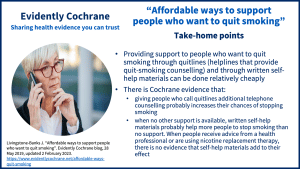Jonathan Livingstone-Banks from the Cochrane Tobacco Addiction Group looks at some of the latest evidence on more affordable ways to help people quit smoking.
Page last updated 2 February 2023.
Take-home points
The 31stof May is the World Health Organization’s World No Tobacco Day. It’s a day for drawing attention to the health risks associated with using or being exposed to tobacco, and for spreading the word about what we can do to reduce that harm. This year’s theme is ‘Tobacco and lung health’. It focuses on how harmful tobacco is for people’s lung health and how important healthy lungs are for people’s health and well-being.
Smoking is extremely bad for you (GBD 2015 RiskA way of expressing the chance of an event taking place, expressed as the number of events divided by the total number of observations or people. It can be stated as ‘the chance of falling were one in four’ (1/4 = 25%). This measure is good no matter the incidence of events i.e. common or infrequent. Factors Collaborators 2016), and most smokers want to quit (CDC 2017). However, quitting smoking can be really hard. That’s why it’s a really good idea for governments to provide support for people who want to quit smoking. The economic burden caused by smoking-related illness is so high that it’s pretty much always going to be a sound investment to put money into evidence-based methods that help people quit, but with concerns about healthcare spending in the UK, and many countries being less able to invest in expensive quit-smoking support, it’s worth thinking about how more affordable forms of support might help people quit.
One way is to provide printed self-help materials that guide people through the quitting process. Another way is to provide support over the phone, via helplines that provide quit-smoking counselling (quitlines). Both of these can be implemented relatively cheaply, but do they work? Two recently updated Cochrane ReviewsCochrane Reviews are systematic reviews. In systematic reviews we search for and summarize studies that answer a specific research question (e.g. is paracetamol effective and safe for treating back pain?). The studies are identified, assessed, and summarized by using a systematic and predefined approach. They inform recommendations for healthcare and research. set out to answer those questions.
Telephone counselling
The Cochrane Review Telephone counselling for smoking cessation (published May 2019) found 104 studies testing the effect of any type of telephone counselling on 111,653 people trying to quit smoking, who had either called quitlines or received calls from counsellors or other healthcare providers. They found that giving people who call quitlines additional telephone counselling probably increases their chances of stopping smoking. The same goes for people who haven’t called a helpline, but received telephone calls from counsellors or other healthcare providers. The evidence was inconclusive about how helpful just calling a quitline is, but that’s because there weren’t many studies, probably because it’s really hard to design a good clinical trialClinical trials are research studies involving people who use healthcare services. They often compare a new or different treatment with the best treatment currently available. This is to test whether the new or different treatment is safe, effective and any better than what is currently used. No matter how promising a new treatment may appear during tests in a laboratory, it must go through clinical trials before its benefits and risks can really be known. to test the helpfulness of quitlines. The review also investigated whether more contact, be it in the number of calls, or the length of discussions, would be more helpful. Unfortunately, there wasn’t enough evidence to be able to tell.
Printed self-help
Another Cochrane Review Print‐based self‐help interventions for smoking cessation (published January 2019) looked at the evidence on leaflets and booklets that guide people through the process of quitting smoking, with advice on quitting to help them to succeed. It includes 75 studies and found that when no other support is available, written self-help materials probably help more people to stop smoking than no support. When people receive advice from a health professional or are using nicotine replacement therapy, there is no evidence that self-help materials add to their effect. However, we can’t rule out them helping a little. Self-help materials that use information about a person to tailor the nature of the advice or support given are probably more effective than no interventionA treatment, procedure or programme of health care that has the potential to change the course of events of a healthcare condition. Examples include a drug, surgery, exercise or counselling. . However, when tailored self-help materials, which usually involve more personal contact, were compared with untailored materials delivered with the same amount of contact, there was no evidence of benefit.
Where do we go from here?
Getting support from printed self-help materials or over the phone can help people to quit smoking, and could be more affordable than other forms of support. This means they could make a potentially important part of tobacco control efforts around the world. However, most of the evidence tested these forms of support in high-income countries, where more intensive support is often available. As of yet there isn’t much research into how effective these forms of support are in low- and middle-income countries, where more intensive support may not be available.
So which is more effective? The Cochrane Tobacco Addiction Group is currently working on an overview of systematic reviewsIn systematic reviews we search for and summarize studies that answer a specific research question (e.g. is paracetamol effective and safe for treating back pain?). The studies are identified, assessed, and summarized by using a systematic and predefined approach. They inform recommendations for healthcare and research. on behavioural interventions for quitting smoking, complete with a network meta-analysisThe use of statistical techniques in a systematic review to combine the results of included studies. Sometimes misused as a synonym for systematic reviews, where the review includes a meta-analysis. and economic commentary, which will hopefully allow us to figure out which is more effective, and how they compare with other forms of behavioural support. Watch this space.
Editor’s note: Behavioural interventions for smoking cessation: an overview and network meta‐analysis was published in January 2021. You can read about it in our blog Quitting smoking: which types of behavioural support work best to help people stop?
You can join in the conversation on Twitter with @CochraneUK or leave a comment on the blog. Please note, we cannot give specific medical advice and do not publish comments that link to individual pages requesting donations or to commercial sites, or appear to endorse commercial products. We welcome diverse views and encourage discussion but we ask that comments are respectful and reserve the right to not publish any we consider offensive. Cochrane UK does not fact check – or endorse – readers’ comments, including any treatments mentioned.
Dr. Livingstone-Banks reports grants from NIHR, during the conduct of the studyAn investigation of a healthcare problem. There are different types of studies used to answer research questions, for example randomised controlled trials or observational studies.




It is a great blog post about smoking.I am always read your blog helpful and informative tips. I like it thanks for sharing this information with us